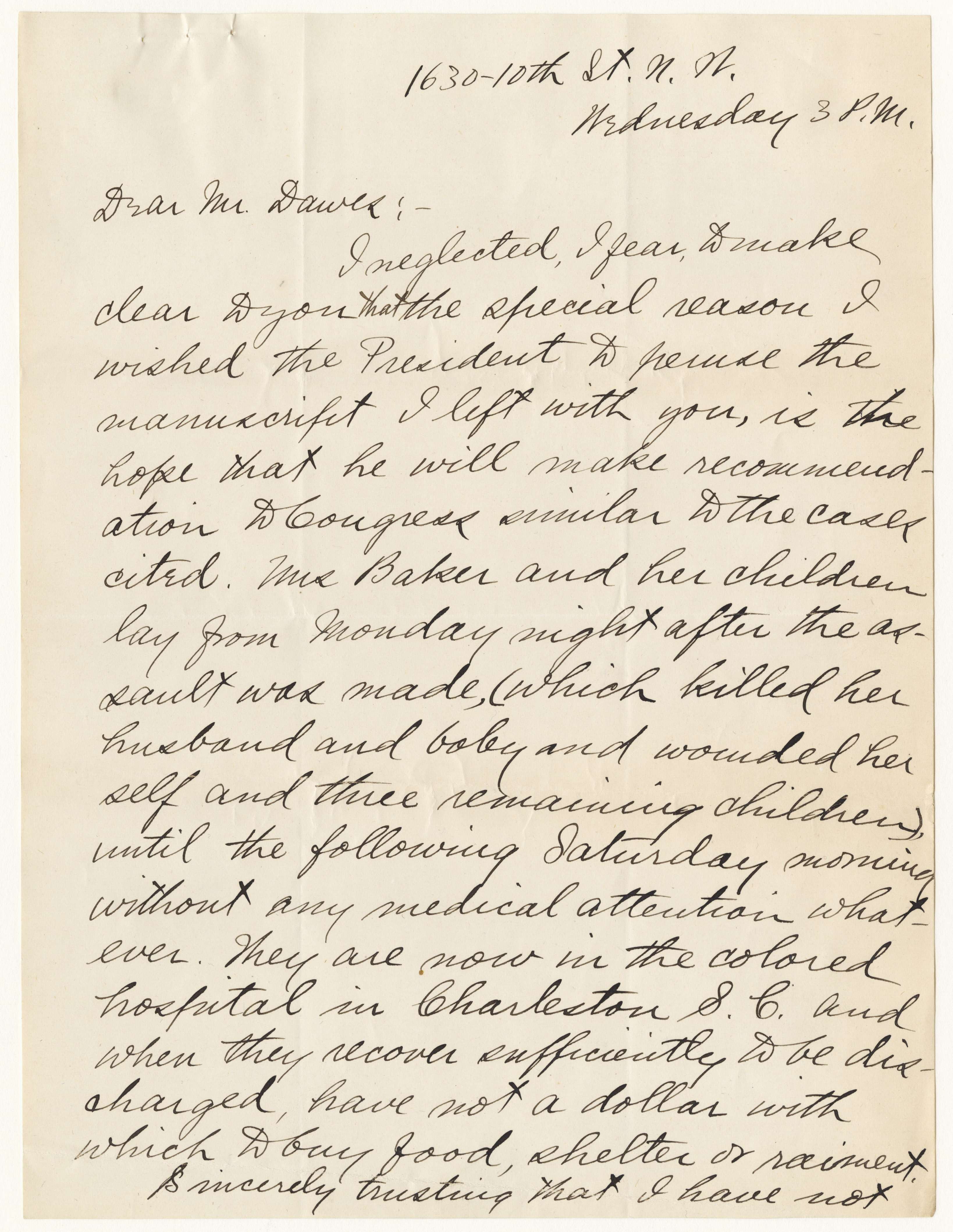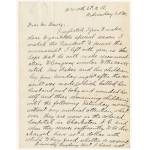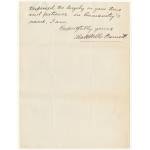Letter from Ida B. Wells-Barnett to Senator Dawes
1898
Add to Favorites:
Add all page(s) of this document to activity:

Add only page 1 to activity:
Add only page 2 to activity:
Born enslaved in Mississippi in 1862, Ida B. Wells became a teacher, journalist, newspaper editor, suffragist, activist, and feminist. After three of her friends were lynched, Wells became a vocal anti-lynching activist and lecturer. Fleeing Memphis because of her activism and journalism, she eventually settled in Chicago where she published the Red Record, the first statistical analysis of lynchings nationwide, and continued her work fighting violence and prejudice against Black Americans.
In this letter to Senator Henry Dawes of Massachusetts, Wells appealed for justice in the lynching of Postmaster Frazier B. Baker and his two-year-old daughter, Julia, in South Carolina, in 1898. She urged Congress to act on behalf of the remaining members of the Baker family. The Department of Justice did not prosecute anyone after an all-white jury produced a mistrial.
Wells-Barnett became internationally known for her anti-lynching activism and was prominent in other causes. She organized The Women’s Era Club, a first-of-its-kind civic club for African American women in Chicago. She also helped to found the Negro Fellowship League (NFL), the first Black settlement house in Chicago. She co-founded the Alpha Suffrage Club in Chicago, the largest black women’s suffrage club in Illinois, helped launch the National Association for Colored Women (NACW), and was a founding member of the National Association for the Advancement of Colored People (NAACP).
In this letter to Senator Henry Dawes of Massachusetts, Wells appealed for justice in the lynching of Postmaster Frazier B. Baker and his two-year-old daughter, Julia, in South Carolina, in 1898. She urged Congress to act on behalf of the remaining members of the Baker family. The Department of Justice did not prosecute anyone after an all-white jury produced a mistrial.
Wells-Barnett became internationally known for her anti-lynching activism and was prominent in other causes. She organized The Women’s Era Club, a first-of-its-kind civic club for African American women in Chicago. She also helped to found the Negro Fellowship League (NFL), the first Black settlement house in Chicago. She co-founded the Alpha Suffrage Club in Chicago, the largest black women’s suffrage club in Illinois, helped launch the National Association for Colored Women (NACW), and was a founding member of the National Association for the Advancement of Colored People (NAACP).
Transcript
1630-10th St. N. W.Wednesday 3 P.M.
Dear Mr. Dawes:
I neglected, I fear, to make clear to you that the special reason I wished the President to peruse the manuscript I left with you, is the hope that he will make recommendation to Congress similar to the cases cited. Mrs. Baker and her children lay from Monday night after the assault was made, (which killed her husband and baby and wounded her self and three remaining children), until the following Saturday morning without any medical attention whatever. They are now in the colored hospital in Charleston S. C. and when they recover sufficiently to be discharged, have not a dollar with which to buy food, shelter or raiment.
Sincerely trusting that I have not trespassed to largely on your time and patience in humanity's name, I am
Respectfully yours
Ida B. Wells-Barnett.
This primary source comes from the General Records of the Department of Justice.
National Archives Identifier: 24746870
Full Citation: Letter from Ida B. Wells-Barnett to Mr. Dawes; 1898; [Case File] 3463/98 Folder 1 of 2, February 1898 to February 1899; Year Files, 1884 - 1903; General Records of the Department of Justice, Record Group 60; National Archives at College Park, College Park, MD. [Online Version, https://docsteach.org/documents/document/wells-dawes, April 25, 2024]Rights: Public Domain, Free of Known Copyright Restrictions. Learn more on our privacy and legal page.





